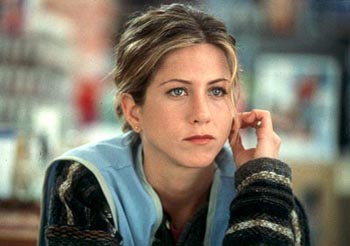![[Metroactive Movies]](/movies/gifs/movies468.gif)
[ Movies Index | Show Times | Silicon Valley | Metroactive Home | Archives ]
 Photograph by Dale Robinette Friends Don't Let Friends Slum In Bad Movies Jennifer Aniston tries to show off her acting chops in 'The Good Girl.' Paper or Plastic? 'The Good Girl' is both as natural as plastic and as thin as paper ONE EASY WAY to make a movie about the little people is to belittle them. The Good Girl, director Miguel Arteta and screenwriter Mike White's follow-up to the art-house success Chuck & Buck, is startlingly patronizing. Only the heroine, Justine (the name may be taken from de Sade's abused good girl in The Misfortunes of Virtue and Justine), a cashier at a sub-Kmart discount store called the Retail Rodeo, has any life or goodness in her. Since everyone uses her, manipulates her or condescends to her, we're supposed to be on her side. She's played by a slumming Jennifer Aniston with a Southern accent that flickers like a light with a defective switch. She dresses in the wardrobe always favored by TV stars who want to show off their acting chops: duffle coats, old shirts and polyester. From her acting, you can tell Aniston would love to be Jennifer Jason Leigh, but she's too blank to play blocked. At night, Justine comes home to her husband, Phil (John C. Reilly, lighted to look like the Wolf Man), and his bosom buddy (Tim Blake Nelson, whose character is named "Bubba"--how on the nose is that?). Both are heavy pot smokers, much to Justine's disgust. After seven years of marriage and a job she hates, she's yearning for a baby. So she sends her husband out for a sperm count. In the meantime, she starts to notice a fellow cashier, who calls himself "Holden" (Jake Gyllenhaal), after The Catcher in the Rye. When a co-worker dies under circumstances the Good Girl doesn't feel like exploring, it's more evidence of the importance of living a full life instead of coming home to these two zombies on the couch. But at a motel with her new lover, Justine is spied upon by her husband's buddy, who blackmails her into sex. It's at this point that Holden starts to show his mental problems. The young lover calls himself Holden, which is bad enough, but his real last name is "Worther" (echoing Goethe's The Sorrows of Young Werther), once again indicating the kind of literary tradition this film's trying to mulct. It ain't Madame Bovary, neither. Justine doesn't get any serious thrill out of being a bad adulterer, just guilt, which she explains in voice-over: apparently, Aniston's face couldn't show what she was feeling. The Good Girl is an indictment of flat lives and flat talk; it's meant for city people to watch and to think, "Yes, that's what the yokels out there are like." (Nelson, usually the liveliest dweeb this side of Steve Buscemi, is made into a Southern gargoyle.) The end goes upbeat in a fake happy-movie way. Depressing, you can handle, but when a film this insulting tells us that, ultimately, things were all for the best, it's worse than depressing, it's horrible.
The Good Girl (R; 94 min.), directed by Miguel Arteta, written by Mike White, photographed by Enrique Chediak and starring Jennifer Aniston, John C. Reilly and Jake Gyllenhaal, opens Friday at the Los Gatos Cinema in Los Gatos and the Guild in Menlo Park..
Send a letter to the editor about this story via email . [ Silicon Valley | Metroactive Home | Archives ]
|
From the August 15-21, 2002 issue of Metro, Silicon Valley's Weekly Newspaper.
Copyright © Metro Publishing Inc. Metroactive is affiliated with the Boulevards Network.
For more information about the San Jose/Silicon Valley area, visit sanjose.com.